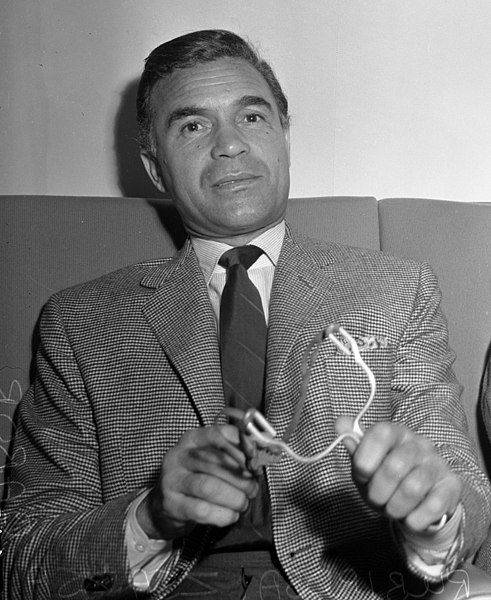Picture a man who oozes charisma, navigates the world’s elite circles with ease, and leaves a trail of enamored women and whispered legends in his wake. A thrill-seeker with a penchant for fast cars, high-stakes polo matches, and glamorous soirées, he seems ripped from the pages of a spy novel. You might think I’m describing James Bond, but this isn’t fiction. Meet Porfirio Rubirosa, a Dominican playboy whose life was so extraordinary it could eclipse even 007’s wildest adventures.
Born in 1909 in the Dominican Republic to a modest family, Rubirosa’s journey to international fame began in an unexpected place: Paris. Sent there as a teenager, he soaked up the city’s sophistication until a failed exam at 17 sent him back home. Little did he know, his native country was about to become a launchpad for a life few could imagine. In 1930, Rafael Trujillo, a ruthless military strongman, seized power in a coup, declaring himself the nation’s dictator. Around the same time, Rubirosa enlisted in the military, though his true passion lay elsewhere-on the polo field, where he captained the national team with effortless flair.
It was during one such match that Trujillo, a man as feared as he was powerful, spotted the young athlete. Rubirosa’s charm was magnetic, the kind that could disarm even the iciest of personalities. Impressed, Trujillo plucked him from obscurity, appointing him a lieutenant in his personal guard. It was a golden opportunity-wealth, prestige, and the favor of a dictator-yet it came with a catch. Trujillo wasn’t just any leader; he was a tyrant whose ego knew no bounds. He renamed the capital “Trujillo City,†demanded churches proclaim him a near-deity, and ruled with a brutality that culminated in atrocities like the Parsley Massacre, where up to 35,000 Haitians were slaughtered on his orders.

Most would shrink under such a shadow, but not Rubirosa. He didn’t just survive-he thrived, and in the most audacious way possible. He wooed Trujillo’s cherished daughter, Flor de Oro, whose name (“Flower of Goldâ€) hinted at her father’s adoration. When their romance sparked, Rubirosa knew he’d crossed a dangerous line. Fleeing into hiding, he dodged the dictator’s wrath long enough for tempers to cool. Trujillo eventually offered an ultimatum: marry Flor or face execution. Rubirosa chose the altar, a decision celebrated with a national holiday and a swift promotion to diplomat.
His first posting? Berlin, 1936, where he watched the Olympics from Adolf Hitler’s private box. From there, his diplomatic career whisked him across Europe and beyond-France, Italy, the United States, Argentina-eventually landing him the cushy, tailor-made role of “Inspector of Embassies.†It was a gig that let him hobnob with the world’s elite, but whispers lingered: was he more than a diplomat? Some speculated he was Trujillo’s enforcer, a spy or even a hitman. The FBI kept him under watch for decades, and in the 1960s, New York authorities grilled him over the disappearances of two Trujillo critics. Proof remained elusive, but the intrigue only burnished his mystique.
Rubirosa’s true fame, however, stemmed from his exploits off the political stage. In the 1940s and ’50s, he stormed the jet-set scene, befriending icons like Frank Sinatra and the Kennedys. Yet it was his prowess with women that cemented his legend. A roster of Hollywood sirens-Marilyn Monroe, Ava Gardner, Rita Hayworth-and global figures like Eva Perón and Iran’s Queen Soraya fell under his spell. His allure was undeniable, bolstered by a certain physical attribute that left tongues wagging. Truman Capote, never one for subtlety, famously likened it to an “eleven-inch café-au-lait sinker,†a detail so notorious it inspired Parisian waiters to nickname oversized pepper mills “Rubirosas.â€
His first marriage to Flor unraveled by 1938, undone by his late nights and wandering eye. Broke without her fortune, Rubirosa turned opportunist as World War II loomed. Using his diplomatic status, he reportedly sold visas to Jews fleeing Europe and smuggled gemstones out of Spain, pocketing a fortune-perhaps $7 million in today’s terms. But easy money beckoned louder. In Paris, he charmed Danielle Darrieux, France’s top actress, into marriage after a Gestapo stint landed him in jail. She secured his release by performing for the Nazis, a move that branded them both as collaborators and nearly cost them their lives in a 1944 ambush by the French Resistance. Rubirosa took three bullets shielding her but survived, retreating to a rural hideaway until the war’s end.

Post-war, Trujillo sent him to Italy, where fate introduced him to Doris Duke, the world’s richest woman and heiress to a tobacco empire. Smitten, Duke allegedly paid Darrieux $1 million to step aside, and Rubirosa’s third wedding brought lavish gifts: polo horses, a Parisian mansion, a B-25 bomber. Yet his roving heart couldn’t settle; an affair with Flor ended the union fast. Duke’s divorce settlement-$25,000 annually until he remarried-kept him flush as he raced Ferraris and lived extravagantly, reportedly burning through $100 million in his lifetime.
Next came Barbara Hutton, heiress to the Woolworth fortune and the world’s second-richest woman. Their 53-day marriage netted him millions, a coffee plantation, and another bomber (he’d crashed the first). Finally, in his 50s, he wed Odile Rodin, a French actress 31 years younger. Their union lasted until his death in 1965, when, after celebrating a polo victory, he crashed his Ferrari into a tree at 80 mph. The steering wheel crushed his chest, ending a life lived at full throttle.
Rubirosa’s legacy endures. Some swear he inspired James Bond-Ian Fleming knew his crowd, after all-and his name still graces pepper mills in certain corners. He was the ultimate playboy, a man who turned charm into an art form and lived a saga too bold for fiction. Next time you twist some pepper onto your plate, spare a thought for the Dominican rogue who spiced up the 20th century.


